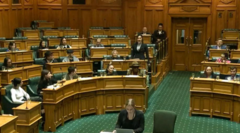In a significant political incident, three Māori parliament members in New Zealand have been suspended following a haka they performed during a parliamentary session, highlighting ongoing tensions surrounding indigenous rights and government policies.
Three Māori MPs Face Suspension After Protest Haka in Parliament

Three Māori MPs Face Suspension After Protest Haka in Parliament
Māori Party MPs receive unprecedented bans for a haka performance in response to controversial legislation.
In a move that has sparked debate about freedom of expression and representation, New Zealand's parliament voted to suspend three Māori lawmakers for their protest haka performed last year. Opposition MP Hana-Rawhiti Maipi-Clarke initiated the traditional dance after her party, Te Pāti Māori (Māori Party), was asked about its stance on a contentious bill that aimed to redefine the Treaty of Waitangi, the nation's founding document. Maipi-Clarke now faces a seven-day suspension, while party co-leaders Rawiri Waititi and Debbie Ngarewa-Packer have received 21-day bans—marking the longest suspensions in New Zealand parliamentary history.
The bill in question, which ultimately failed to pass, sought to legally define the principles of the 1840 treaty between the British Crown and Māori leaders, a move critics argued could have exacerbated divisions within New Zealand society. The Māori community's relationship with the current conservative government has been strained, and the performances by the MPs—a classic Māori expression of defiance—have garnered international attention since being filmed last November.
In a heartfelt speech during the debate regarding their punishments, Maipi-Clarke asserted, "We will never be silenced, and we will never be lost," questioning if their actions were a reflection of having "too loud" voices in the parliamentary space. Tensions escalated during the discussions, with Foreign Minister Winston Peters referring to the Māori Party as a “bunch of extremists,” which further polarized the dialogue.
The proposed Treaty Principles Bill, which was heavily protested—drawing over 40,000 demonstrators to the capital last year—was ultimately rejected by a significant margin. As New Zealand continues to grapple with its colonial history and the quest for equality for its Māori population, the impact of this parliamentary suspension reveals both the challenges faced by indigenous representatives and the ongoing struggle for their voices to be heard in the political arena.
The bill in question, which ultimately failed to pass, sought to legally define the principles of the 1840 treaty between the British Crown and Māori leaders, a move critics argued could have exacerbated divisions within New Zealand society. The Māori community's relationship with the current conservative government has been strained, and the performances by the MPs—a classic Māori expression of defiance—have garnered international attention since being filmed last November.
In a heartfelt speech during the debate regarding their punishments, Maipi-Clarke asserted, "We will never be silenced, and we will never be lost," questioning if their actions were a reflection of having "too loud" voices in the parliamentary space. Tensions escalated during the discussions, with Foreign Minister Winston Peters referring to the Māori Party as a “bunch of extremists,” which further polarized the dialogue.
The proposed Treaty Principles Bill, which was heavily protested—drawing over 40,000 demonstrators to the capital last year—was ultimately rejected by a significant margin. As New Zealand continues to grapple with its colonial history and the quest for equality for its Māori population, the impact of this parliamentary suspension reveals both the challenges faced by indigenous representatives and the ongoing struggle for their voices to be heard in the political arena.






















